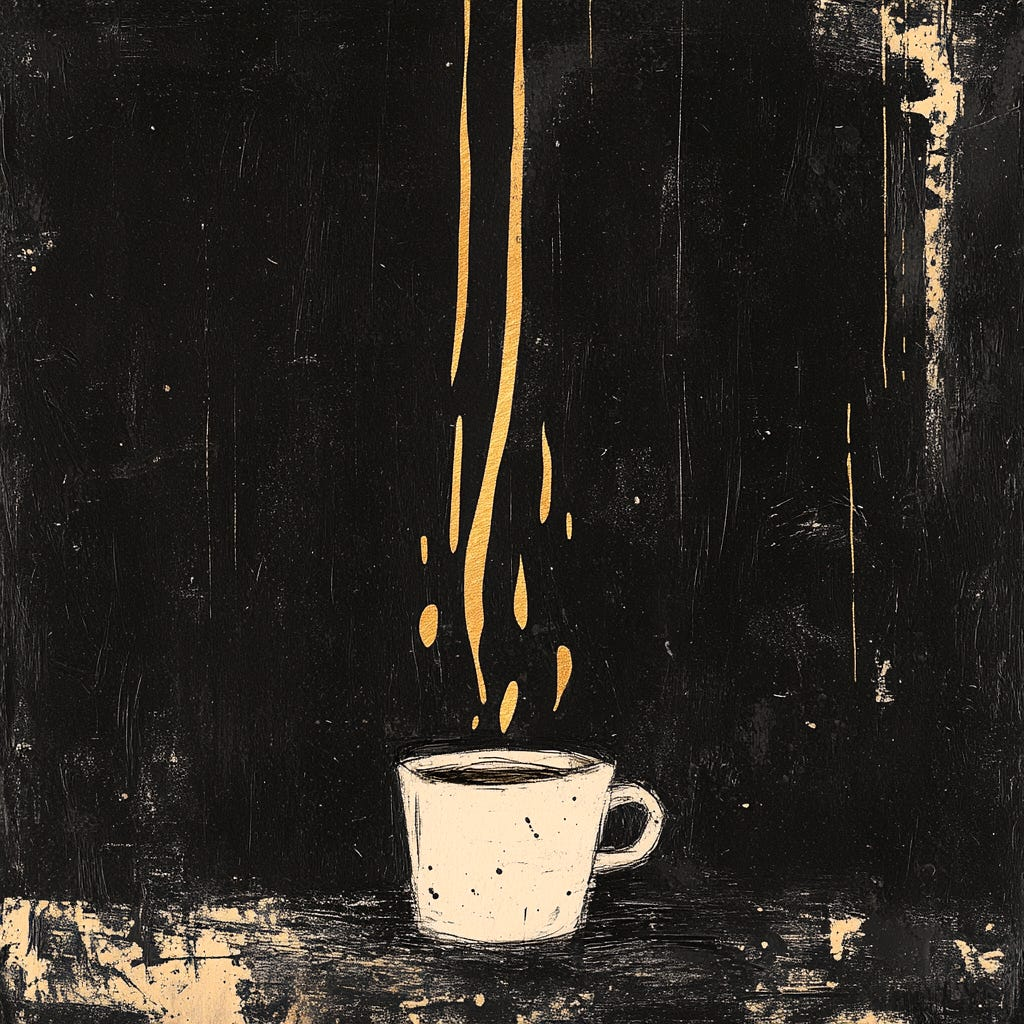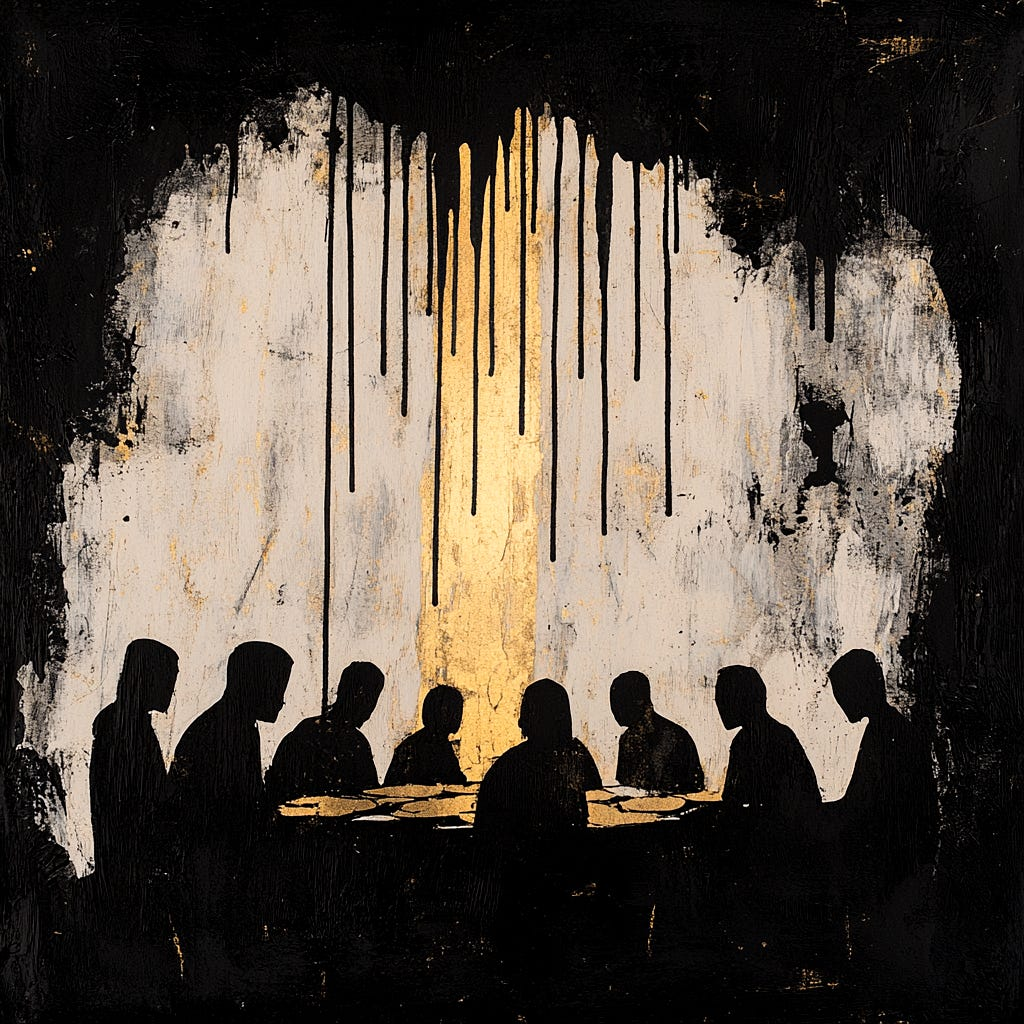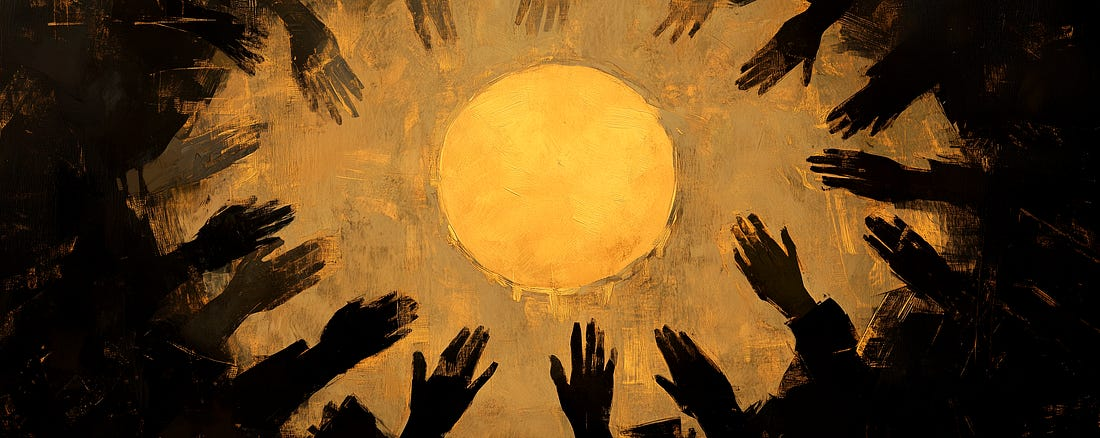10 - Jesus Frequency: The Religion of Jesus
Oct 17, 2025
Your Real Life Begins

“Love one another. As I have loved you, so you must love one another.”
Simple words. Hard practice.
Jesus said this to fishermen who would abandon him. Peter, who would deny him. Thomas, who would doubt. Judas, who had already made the deal.
He knew. And he loved them anyway.
I’m writing this as someone who fails at this daily. Choosing comfort over courage. Loving conditionally when I know better. My mentor recently entered hospice. Before he did, he told me: “Don’t wait to do what you know you should do.” So I’m not waiting. What I’m offering isn’t mastery—it’s the stumbling recognition of someone trying to actually live what Jesus demonstrated, not just study it.
For nine chapters, we’ve dismantled the machinery together. Exposed the lies about payment. Revealed the fear weaponized as control. Traced how Rome captured the revolution.
Now comes the harder part.
Not understanding it. Living it.
The religion about Jesus taught you to believe correct things and wait for heaven.
The religion of Jesus asks something simpler and more terrifying: Can you trust God the way a child trusts a parent? Can you love the person in front of you when it costs you something?
That’s where this gets real.

The Faith That Held Him
Before we talk about practice, look at what made Jesus’s life possible.
He trusted God completely.
Not naively. Not as escape from difficulty. As response to difficulty.
His faith was childlike but in no sense childish.
Jesus faced betrayal, torture, public humiliation, excruciating death. He met these with faith that didn’t demand protection from hardship—faith that transformed hardship into demonstration.
To Jesus, mortal life had dealt its hardest, cruelest, and bitterest blows. And this man met these ministrations of despair with faith, courage, and the unswerving determination to do his Father’s will.
He didn’t use religion to escape life, but to enhance it. To make sense of suffering. To find meaning in darkness. To demonstrate that love survives what kills the body.
This is what makes the religion of Jesus different from every other faith system: it doesn’t promise to remove difficulty. It promises to help you master it through trust.
His faith was wholly personal and purely spiritual. Not traditional. Not intellectual. Not borrowed from priests or acquired through study.
Living faith. The kind born from actual experience with the Father.
And here’s what changes everything: Jesus said we would do greater things than he did (John 14:12).
Not because we’re more powerful. Because what he demonstrated in one life, we can demonstrate through millions simultaneously.
Your small acts of love matter cosmically. You’re not waiting for permission. You’re already qualified by your willingness to try.

What It Looks Like
The religion of Jesus isn’t theory. It’s practice.
Not practice that requires monastery or seminary. Practice that happens in the space between waking and coffee. Between traffic and meetings. Between argument and apology.
Jesus said “The kingdom of God is within you” (Luke 17:21).
Paul said “Christ in you, the hope of glory” (Colossians 1:27).
These aren’t metaphors to make us feel spiritual. They’re describing actual reality.
The Spirit that raised Jesus dwells in you. Today you demonstrate what that looks like.
Some mornings you remember this. Some mornings you forget.
On the mornings you remember, everything changes.
The coffee tastes different when you’re genuinely grateful. Not performing gratitude, but actually recognizing: I have hands that work. A nervous system that experiences pleasure. None of this guaranteed. All of it gift.

Your spouse looks different across the table when you see them clearly. Not the person you’ve negotiated with for years. Another child of God, carrying the same divine image beneath layers of programming and fear.
You don’t suddenly love them perfectly. But you see them.
Vision precedes compassion. When you choose to see, your heart opens whether you want it to or not.
The grocery store. The post office. The doctor’s waiting room. Same faces you pass without seeing.
But today you see them.
The janitor mopping floors. When did he become invisible? You make eye contact. Say good morning. Actually mean it.
The cashier handling your transaction. Tired. Overworked. Treated like a machine by everyone before you. You ask how her day is going. Actually listen to the answer.
“Whatever you do, work at it with all your heart, as working for the Lord” (Colossians 3:23).
This is what Jesus meant.
Not complicated theology. Just see people. Love them. Serve them.
Even when they might not deserve it.

The Economics of Trust
The bills come. You have enough to cover them. Barely.
Then someone asks for help.
Every financial advisor would say protect your security first. Build your emergency fund. Don’t enable bad behavior.
But Jesus said “Give to everyone who asks you” (Luke 6:30).
Not prosperity gospel. Jesus wasn’t wealthy. His disciples weren’t wealthy. The early church shared resources while many remained poor.
Abundance doesn’t mean luxury.
It means you have what you need, when you need it, to do what you’re called to do.
The widow with two coins had abundance. She gave what she could and trusted God with the rest (Luke 21:1-4). The rich young ruler lacked abundance despite his wealth. He couldn’t release what he hoarded (Matthew 19:16-22).
The difference wasn’t the amount. It was the posture.
One held resources with open hands. One clutched them with closed fists.
Jesus revealed your relationship with material things exposes your trust in the Father.
When you hoard, you declare: “God might not provide. I must secure myself.”
When you circulate, you declare: “The Father is faithful. I can risk generosity.”
The early church “shared everything they had” (Acts 4:32). Not because they were commanded. Because recognition of divine sonship naturally produces generosity toward siblings.
This doesn’t solve poverty. Doesn’t replace justice with charity.
But it creates alternative economy within broken system. Pockets where people actually take care of each other while working toward larger transformation.
You give what you can. Sometimes it costs you. Sometimes you miscalculate and give too much. Sometimes people take advantage.
But you keep practicing open-handed living because Jesus demonstrated that Kingdom economics work differently than empire economics.
Empire says: accumulate, protect, compete
Kingdom says: circulate, trust, share
The Father doesn’t guarantee you’ll never face financial difficulty. He promises to provide what you need to do what you’re called to do.
That’s a different promise than prosperity.
The Community You Build
Sunday morning. You don’t go to church anymore.
That sentence would have horrified you five years ago. Now it’s just fact.
Instead, you gather with a few others in someone’s living room.
No liturgy. No sermon. No offering plate.
“They devoted themselves to the apostles’ teaching and to fellowship, to the breaking of bread and to prayer” —Acts 2:42
Four practices. That’s it.
- Teaching. Learning together what Jesus actually demonstrated.
- Fellowship. Genuine relationship, not religious performance.
- Breaking bread. Sharing meals, resources, life together.
- Prayer. Recognizing the Father’s presence and seeking guidance.
No professional clergy mediating between you and God. No institutional structure managing your spirituality. No building fund or denominational hierarchy.
Just people practicing mutual aid and spiritual formation together.
One of you needs help moving. Everyone shows up. Another needs money for car repair. You all contribute what you can. Someone’s going through divorce. You sit with them through the pain without trying to fix it.
This is church. Not physical building. Not established institution. Just people trying to love each other the way Jesus loved his disciples.
Imperfectly. Honestly. Patiently.
Some weeks it’s beautiful. Some weeks it’s messy. Some weeks someone gets hurt and you have to work through conflict without institutional authority to manage it.
The religion of Jesus produces communities of believers, not institutions for believers.
Communities form organically around shared practice. Institutions form systematically around preserved doctrine.
Communities adapt, evolve, multiply. Institutions calcify, defend, consolidate.
Jesus gathered disciples. Taught them. Sent them out to do likewise. They gathered others. Taught them. Sent them out.
Multiplication, not accumulation.
When Rome institutionalized the movement, it stopped multiplying and started building. Cathedrals instead of kitchens. Hierarchy instead of brotherhood. Doctrine instead of practice.
You’re returning to the original pattern. Not because institutions are evil, but because this is how the religion of Jesus naturally expresses.
If your current church facilitates genuine community. Stay. Your presence matters. Your voice matters. You might be the agent of reformation that community needs.
If it doesn’t, if you’re exhausted from performing, if the system demands conformity over authenticity, then find others doing this outside institutions.
The Kingdom doesn’t require permission to manifest. It just requires people willing to practice.
You keep showing up. Keep trying. Keep choosing love even when it’s easier to quit.
Because this is what Jesus demonstrated.
The Father’s family doesn’t need buildings or budgets or bishops.
It needs siblings who actually love each other.

The Death You Don’t Fear Anymore
Eight years ago, death kept me up at night. Death as ending. Death as wall. Death as the worst thing that could happen.
Today I know different.
I read what Jesus demonstrated. He didn’t use religion to escape death. He walked through it to show us it’s a doorway.
When you sit with someone dying, when you hold their hand and watch breath become labored and body fail, you can be terrified of the ending.
Or you can remind them of the truth. You’re not ending. You’re continuing.
Everyone who went before is on the path too. You’re going home to the Father. Growth continues.
The resurrection proved it. Death is transition, not termination. Consciousness survives what kills the body. Love is stronger than death.
Jesus said “In my Father’s house are many homes” (John 14:2).
Not retirement condos in clouds. Something more.
If consciousness continues, and growth continues, then this life isn’t final exam. It’s Kindergarten. We’re learning here what we’ll use somewhere else, in ways we can’t yet imagine.
The religion about Jesus taught you to fear death.
Behave correctly or face eternal torture.
Trade mortal terror for immortal anxiety.
The religion of Jesus teaches that death is natural transition in eternal progression. The Father doesn’t end His children. He graduates them.
You still grieve when someone you love dies.
Separation hurts even when you know it’s temporary.
But beneath the grief lives certainty.
They’re not gone. Just ahead of you on the path everyone walks.
You live differently when death is doorway not wall.
You risk more. Love deeper. Give freely.
You’re not protecting brief existence from annihilation. You’re developing character that lasts forever.
What you’re becoming matters more than what you’re acquiring. Who you love matters more than what you accomplish.

The Simple Truth
The religion of Jesus isn’t complicated. It’s just hard.
- Love your enemies. Not theoretical ones but the actual person who makes your life difficult.
- Forgive without limit. Not when they deserve it, especially when they don’t.
- Serve without recognition. Not when it advances you, when nobody’s watching.
- Trust the Father. Not when everything’s stable, when the future looks terrifying.
- Share your resources. Not your excess, what costs you to release.
- See the divine image in everyone. Not just people like you. Everyone.
This will cost you everything comfortable. Your security. Your need to be right. Your requirement for fairness. Your insistence on getting what you deserve.
But you’ll gain something infinitely more valuable. You’ll become human the way humans were designed to be.
You’ll discover that love isn’t just moral principle but actual force that reorganizes reality.
You’ll find that the Kingdom Jesus talked about isn’t future destination but present possibility.
You’ll become the demonstration.
Not perfect. Not heroic. Just faithful.

Your Next Breath
You’re reading this and you feel it.
Not just understanding intellectually. Feeling it.
That ache in your chest that says: yes. This. This is what I’ve been looking for beneath all the theology and institution and religious performance.
Just love. Just service. Just the Father’s presence. Just choosing connection over isolation.
You don’t need permission to start. You don’t need credentials. You don’t need perfect understanding or resolved theology.
You just need your next breath.
And the choice you make between this inhale and the next.
Love or fear.
Service or extraction.
Trust or control.
The Kingdom doesn’t need you to be ready.
It needs you to try.
Right now. This moment. With the person in front of you.

Welcome Home
The common people heard Jesus gladly.
They responded to his sincere human life. His consecrated religious motivation. The way he actually lived what he taught.
And they will again.
Not because institutions approve. Not because theology perfectly aligns. But because truth resonates when it’s actually demonstrated.
You heard him gladly. You responded. You recognized.
Because the Father called.
Because truth resonated.
Because it was real.
The religion of Jesus is what happens when humans remember who they are.
Children of God. On assignment.
Not converts waiting for salvation. Consciousness recognizing itself.
Not followers worshiping distant deity. Partners sharing his faith.
Not sinners hoping for rescue. Children discovering Father.
Jesus didn’t come to start a religion. He came to demonstrate what’s possible when human consciousness aligns perfectly with divine will.
He showed us the way. Now we walk it.
Not perfectly. Not heroically. Just faithfully.
One breath at a time. One choice at a time. One person at a time.
You may preach a religion about Jesus.
But we must live the religion of Jesus.
This series concludes.
Your frequency begins.
<3 EKO

Thank you for walking this entire journey with me. We’re here now.
This concludes The Jesus Frequency series.

No comments to display
No comments to display